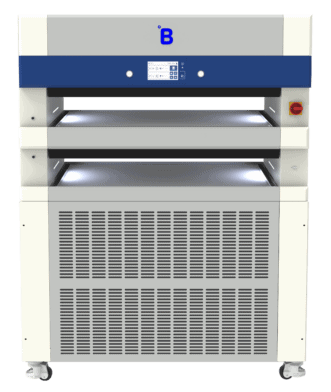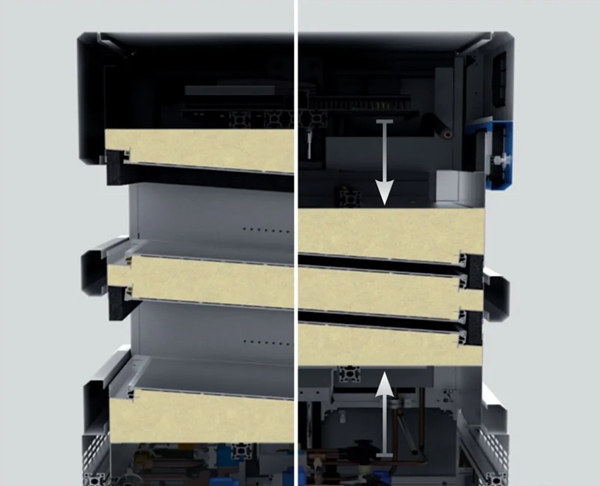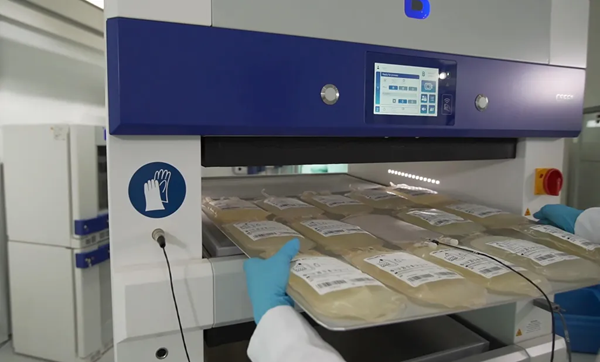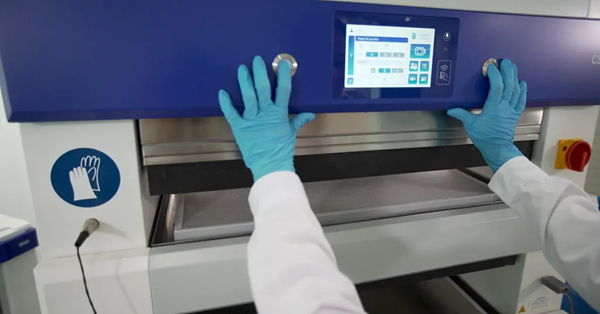The Plasma Contact Shock Freezer CSF101 L is an air-cooled plasma contact shock freezer.
- Set Temperature: –50 °C
- Climate class (ambient temperature range): +10 °C to +32 °C
- External dimensions (H × W× D): 1910 × 1500 × 830 mm | 75.20 × 59.06 × 32.68 inches
- Refrigerant Type: R449a

Image Credit: B Medical Systems
Download the Brochure for More Information
Description
Innovative freezing technology

Image Credit: B Medical Systems
- Homogeneous cooling of bags despite the presence of air bubbles or uneven filling.
- Linear actuators that self-adjust to apply the proper force against your plasma bags.
- No exposure to extremely low temperatures, avoiding the crazing of the bags.
- Two cooling plates are inclined at 5° for a superfast freezing cycle.
- Two levels that operate independently, allowing simultaneous freezing and defrosting as necessary.
High-performance cooling system

Image Credit: B Medical Systems
- Dual-stage compressors
- Eco mode
- Inclined freezing plates
- Low environmental impact refrigerant
- Multiple injection valves
Integrated monitoring solution for complete traceability

Image Credit: B Medical Systems
- °B Connected universal software for remote monitoring, recording, and long-term archiving
- 7” color touchscreen display at eye level with access to all functions
- Advanced audio-visual alarm system with remote transmission
- Barcode scanner
- Batch management
- Electronic reports through °B Connected are compliant with FDA 21 CFR Part 11
- USB port and SD card slot for easy export of data
Download the Brochure for More Information
Technical specifications
Source: B Medical Systems
| . |
. |
| Plasma bag capacity (250 ml) |
48 (single layer); 96 (double layer) |
| Plasma bag capacity (850 ml) |
32 (single layer) |
| Set Temperature |
-50 °C |
| Freezing time to -30 °C (250 ml) |
26 min |
| Freezing time to -30 °C (850 ml) |
50 min |
| Operating temp. (pre-cooling) |
-40 °C |
| Operating temp. (ECO) |
-43 °C |
| Climate class (ambient temperature range) |
+10 °C to +32 °C |
| Certifications |
EU MDR Class IIa | SCoPE | US FDA Class II |
| Cooling technology |
Plates conduction |
| External dimensions (H × W × D) |
1910 × 1500 × 830 mm | 75.20 × 59.06 × 32.68 in |
| Net weight |
690 kg | 1521.19 lb |
| Frequency |
50-60 Hz |
| Supply voltage |
380-400 V |
| Energy consumption |
0.8 kWh/24 h |
| Noise level |
75 dB |
| Refrigerant Type |
R449a |
| Display |
7" touchscreen screen |
| Remote monitoring |
°B Connected software |
| Access control |
Password or badge |
| Data export |
SD card | USB port |
| Product Type |
Plasma Contact Shock Freezer |